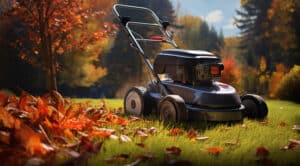Why Are Leaf Blowers Notoriously Loud?
Key Takeaways
- The high-speed airflow generated by leaf blowers contributes to their loudness.
- The motor or engine used in leaf blowers generates both vibration and sound, adding to the noise level.
- Gas-powered leaf blowers emit exhaust noise and lack effective muffling, making them particularly loud.
Leaf blowers have long been known for their notorious noise levels. Whether you’ve experienced the deafening sound firsthand or simply heard your neighbor’s leaf blower in action, it’s hard to ignore the racket they produce. But what exactly makes leaf blowers so loud? In this article, we will explore the various factors that contribute to their high noise levels and discuss whether there are quieter alternatives available.
The Factors Behind the Noise
Multiple sources have shed light on the reasons why leaf blowers are so loud. One significant factor is the high-speed airflow they generate. When leaves and debris are blown away, the air is propelled at a high velocity through a narrow tube. This air propulsion mechanism creates a considerable amount of noise.
Another contributor to the noise is the motor or engine used in leaf blowers. Whether it’s a two-stroke or four-stroke engine, it generates both vibration and sound. Despite their smaller size compared to car engines, leaf blower engines can still produce a significant amount of noise.
The design of the leaf blower’s blades and propeller also plays a role in the noise production. When the blower is started, the blades create audible popping sounds as they rotate. Additionally, the low frequency of the noise allows it to travel far and penetrate through structures, making it difficult to block out the noise.
Furthermore, gas-powered leaf blowers emit exhaust noise, which adds to their overall loudness. These blowers lack effective muffling, allowing the noise to escape more easily. The lack of sound insulation in leaf blowers also contributes to their noisy operation. Vibrations during the blower’s operation can further amplify the noise levels.
In summary, the main factors contributing to the notorious loudness of leaf blowers are:
- High-speed airflow
- Noise from the motor or engine
- Noise from the exhaust system in gas-powered blowers
- Vibrations during operation
- Lack of sound insulation
- High RPM
- Insufficient muffling
Quieter Alternatives
While traditional leaf blowers may be notorious for their noise levels, there are quieter alternatives available. Several sources mention various options that operate at 70 decibels or less, offering a more peaceful experience:
- RYOBI RY40470VNM – A cordless battery-powered leaf blower
- Ego Power+ LB7654 – A cordless battery-powered leaf blower
- Kobalt KHB 400B-06 Brushless – A cordless battery-powered leaf blower
- Worx WG521 – A corded electric leaf blower
- Toro 51621 UltraPlus – A corded electric leaf blower
Conclusion
In conclusion, leaf blowers are notoriously loud due to a combination of factors. The high-speed airflow they generate, the noise produced by their motor or engine, the exhaust noise in gas-powered blowers, vibrations during operation, lack of sound insulation, high RPM, and insufficient muffling all contribute to their noisy operation. However, there are quieter alternatives available that offer similar power without the drawbacks of excessive noise. Consider exploring these options if you’re seeking a more peaceful leaf blowing experience.
Related Websites:
FAQs:
Q: Why are leaf blowers notoriously loud?
Leaf blowers are notoriously loud due to the mechanics involved in generating high air velocity. The combustion process in the engine and the design of the fan contribute to noise production.
Q: What is the impact of prolonged exposure to loud noise?
Prolonged exposure to loud noise can cause hearing damage and other health issues. It is important to be aware of noise levels and take necessary precautions, such as using ear protection.
Q: How do leaf blowers generate high air velocity?
Leaf blowers generate high air velocity through the design of their fans and the power of their engines. The fan speed and airflow play a crucial role in producing the necessary force to blow leaves and debris.
Q: What efforts have been made to reduce the noise of leaf blowers?
Manufacturers have made efforts to reduce the noise of leaf blowers through engineering. They have implemented noise reduction technologies and developed quieter engine designs. However, it is also important for consumers to consider using ear protection for additional noise reduction.
Q: Are there any noise regulations for leaf blowers?
Yes, some areas have imposed noise regulations and restrictions on leaf blowers. It is essential to be aware of the local regulations and comply with them when using leaf blowers.






